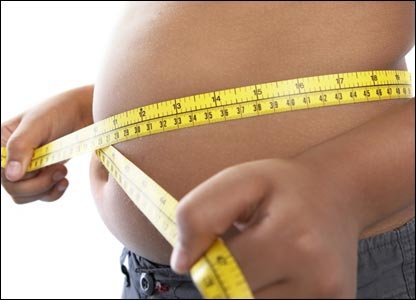Obesity
Obesity
There are many indices for obesity. Simply put, anyone (including children) whose actual weight is 20 percent or more above the mean weight for their height is obese.
Overweight in a child under three years of age should not be a cause for worry unless at least one parent is also obese. After the age of three, however, it is more likely that obesity will persist into adulthood. A child who is obese beyond six years of age has a more than 50% risk of becoming an obese adult. 70 to 80 percent of obese adolescents will remain so as adults.
Causes of Childhood Obesity
Only a small percentage of childhood obesity is associated with a hormonal or genetic defect.
Hypothyroidism, though rare, is the most frequently considered endogenous abnormality in obese children. Hypercortisolism (Cushing’s syndrome) is another frequently suspected cause of endogenous obesity.
Most often, the cause of childhood obesity is due to over eating. A person gains weight when energy input exceeds energy output. Energy input is food. 3,500 calories is equivalent to 0.5 kg; thus, an excess intake of only 50 to 100 calories per day will lead to a 2.5 to 5 Kg weight gain over one year. As a result, a relatively small imbalance between energy input and output can lead to significant weight gain over time. Most obese children demonstrate a slow but consistent weight gain over several years.
Some psychiatric disorders lead to over eating. These include Bulimia nervosa, Depression, behavioral and emotional disorders with poor self-esteem, negative self-image and withdrawal from peers, stress from family or school, and pathological family dynamics
Treatment:
Prevention is the best way to handle the issue of obesity (see Tips for Preventing Obesity – on this page).
When a child does develop obesity, a serious attempt at weight reduction should be undertaken (see Tips to lose weight – on this page).
Any emotional disorder such as Bulimia nervosa, Depression, behavioral and emotional disorders with poor self-esteem, negative self-image and withdrawal from peers should be actively treated by a psychiatrist. Any stress from family or school, and pathological family dynamics that are identified should be corrected as soon as possible.

Tips for preventing obesity:
- Respect your child’s appetite: children do not need to finish every bottle or meal.
- Avoid pre-prepared and sugared foods when possible.
- Do not provide food for comfort or as a reward.
- Do not offer sweets or desert in exchange for a finished meal.
- Limit the amount of high-calorie food – sweets, chocolates, fried food, bakery items – kept at home.
- Provide a healthy diet. High protein, moderate carbohydrate, low fat (30 percent or fewer calories derived from fat).
- Provide plenty of high fiber food – vegetables, salads, fruits, nuts, whole grain cereals
- Replace full fat milk with skimmed milk after 2 years of age.
- Limit the amount of television viewing.
- Encourage active play.
- Establish regular family activities such as walks, ball games and other outdoor activities. \
Tips for weight loss:
- Reasonable weight-loss goal: Initially 2 Kg, then a rate of one to two Kg per month.
- Dietary management: Health, balanced diet with total number of calories per day prescribed by physician or nutritionist, with recommended percentage of calories from fat, protein and carbohydrates.
- Physical activity: Begin according to child’s fitness level, with ultimate goal of 20 to 30 minutes per day (in addition to school activity).
- Behavior modification: Self-monitoring, nutritional education, stimulus control, modification of eating habits, physical activity, attitude change, reinforcements and rewards.
- Family involvement: More physical family activity and less television viewing.
